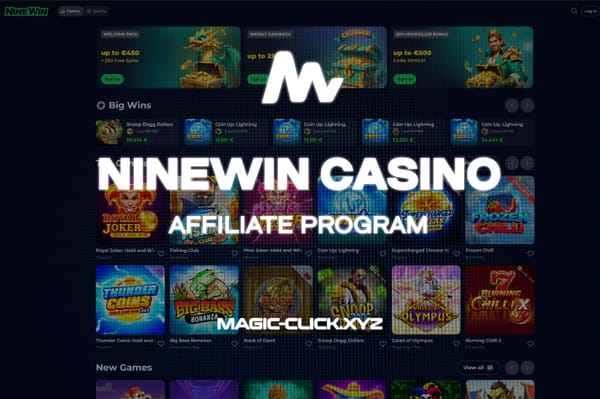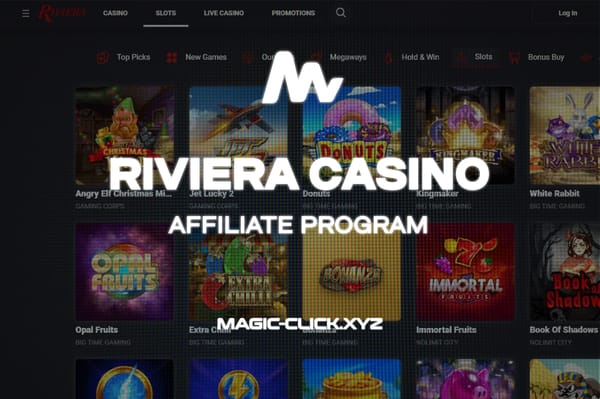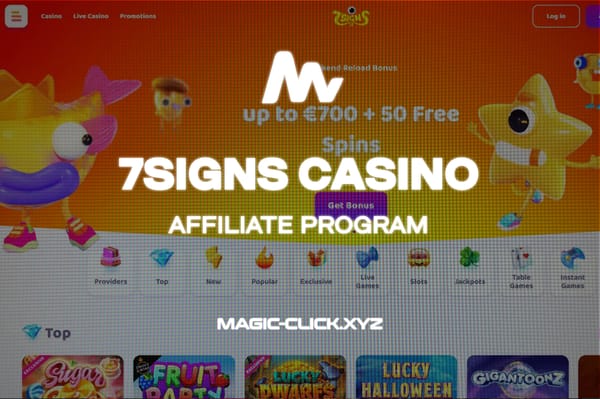Guide to Key Metrics in Affiliate Marketing: Gambling
As a gambling affiliate marketer, understanding and tracking the right metrics is essential for maximizing your profits. Affiliate…

As a gambling affiliate marketer, understanding and tracking the right metrics is essential for maximizing your profits. Affiliate marketing in the gambling niche can be highly profitable, but to succeed, you need to be able to measure your performance and optimize your campaigns accordingly. In this article, we will explore the key metrics you should focus on to ensure your gambling affiliate campaigns are successful and profitable in 2024.

⠀ Magic Click Partners — Reliable CPA network with over 1000 offers in ⠀⠀⠀⠀⠀⠀⠀⠀iGaming and Betting verticals from direct advertisers.

Why Metrics Matter in Gambling Affiliate Marketing
In the world of gambling affiliate marketing, it’s not enough to simply run ads and hope for the best. You need data to guide your decisions. By analyzing the right metrics, you can:
- Optimize your ad spend to maximize returns.
- Identify profitable traffic sources and focus your efforts where they matter most.
- Refine your ad creatives, targeting, and landing pages for higher conversions.
- Understand your audience’s behavior, which helps in tailoring offers that resonate with them.
By focusing on the right metrics, you can turn your affiliate marketing campaigns into a sustainable and profitable business.
1. Cost Per Acquisition (CPA)
Cost Per Acquisition (CPA) is one of the most important metrics for gambling affiliates. It measures how much you are spending to acquire a new customer who converts on a gambling offer. This is the amount of money you pay for each conversion, such as when a user registers on a casino site or makes their first deposit.

- How to Use CPA: To determine if your campaign is profitable, compare your CPA with your affiliate commission. If your CPA is higher than what you’re earning per conversion, your campaign is likely not sustainable. Optimizing this metric can involve refining your targeting, improving your ad creatives, or adjusting your bids on platforms like Google Ads or Facebook Ads.
2. Click-Through Rate (CTR)
Click-Through Rate (CTR) measures how effective your ads are at driving traffic. It represents the percentage of users who click on your ad compared to the number of times it was shown. A high CTR generally means your ad is engaging and relevant to your audience.

- How to Use CTR: Track CTR to gauge how well your ads are resonating with users. If your CTR is low, consider testing different ad creatives, headlines, or calls to action (CTAs). It’s crucial to ensure your ad copy is compelling and closely aligned with the keywords or interests of your target audience.
3. Conversion Rate (CR)
Conversion Rate (CR) measures the percentage of visitors who take the desired action on your affiliate offer after clicking on your ad. This could be anything from signing up for a betting site to making a first deposit or claiming a casino bonus.

- How to Use CR: A high conversion rate indicates that your landing page and affiliate offer are well-optimized. If your conversion rate is low, it might be time to test different landing pages, optimize your content for mobile users, or improve the clarity of your call-to-action (CTA). Ensuring that your landing page matches the ad’s promise is key to improving your CR.
4. Return on Investment (ROI)
Return on Investment (ROI) is perhaps the most critical metric to track in gambling affiliate marketing. It tells you how much profit you’re making relative to your ad spend. A positive ROI indicates that your campaigns are profitable, while a negative ROI means you’re spending more than you’re earning.

- How to Use ROI: To calculate ROI, use the formula:
ROI = (Revenue — Cost) / Cost x 100%
If your ROI is negative, you need to reevaluate your ad strategy, targeting, and offers. Focus on optimizing for the best-performing campaigns and allocate more budget to them.
5. Lifetime Value (LTV)
Lifetime Value (LTV) refers to the total amount of revenue a customer will generate for you over the entire time they engage with the gambling site. This is especially important in gambling affiliate marketing, as customers who stay active over the long term can be highly valuable.

- How to Use LTV: By knowing the LTV of a customer, you can calculate how much you should be willing to spend on customer acquisition (CPA). If your LTV is high, it allows for more flexibility in how much you spend to acquire each customer. Understanding LTV can help you decide whether to target new players or focus on retaining existing customers through promotions or bonuses.
6. Revenue Per Click (RPC)
Revenue Per Click (RPC) measures how much revenue you earn for every click on your affiliate link. This metric is useful for determining the profitability of your traffic sources.

- How to Use RPC: Track your RPC to identify the most profitable traffic sources. If you are running multiple campaigns, compare the RPC across each campaign to find out which one brings in the highest return. This can help you allocate more of your budget toward the best-performing campaigns and traffic sources.
7. Earnings Per Click (EPC)
Earnings Per Click (EPC) is similar to RPC but focuses on the revenue generated per click in relation to your affiliate network or the specific offer you’re promoting. This is particularly useful when promoting multiple gambling offers or networks.

- How to Use EPC: Monitor the EPC of each offer to see which ones are driving the most revenue. You can use this data to optimize your marketing efforts, promoting offers that generate the highest EPC.
8. Traffic Quality
While metrics like CTR and CPA focus on the volume of clicks and conversions, it’s also essential to assess the quality of your traffic. High-quality traffic means that the users who click on your ads are more likely to engage with your offers and convert.
- How to Use Traffic Quality: To assess the quality of your traffic, look at metrics like bounce rate and time on page. If visitors are clicking on your affiliate links but leaving your landing pages quickly, your traffic may not be as qualified as you think. Use targeting tools to refine your audience and focus on people who are most likely to be interested in gambling offers.
9. Ad Spend Efficiency
Ad Spend Efficiency measures how efficiently you’re using your advertising budget to drive profitable conversions. It involves comparing the cost of running ads with the number of conversions and the revenue generated.
- How to Use Ad Spend Efficiency: To improve ad spend efficiency, optimize your campaigns based on the cost-per-click (CPC) and cost-per-conversion (CPA). Test different ad creatives and targeting strategies to find the most cost-effective approach that maximizes your conversions.
Conclusion: Tracking Metrics for Long-Term Success
In gambling affiliate marketing, focusing on the right metrics is essential for running profitable campaigns. By tracking CPA, CTR, conversion rate, ROI, and other key metrics, you can identify areas for improvement and refine your campaigns to achieve better results.
Success in gambling affiliate marketing doesn’t happen overnight, but by continuously measuring and optimizing your campaigns, you can build a scalable and sustainable business. Use these metrics to ensure that every campaign you run is working towards maximizing your revenue and minimizing your ad spend.
With the right data and strategy, you can elevate your affiliate marketing efforts and dominate the gambling niche in 2024.





